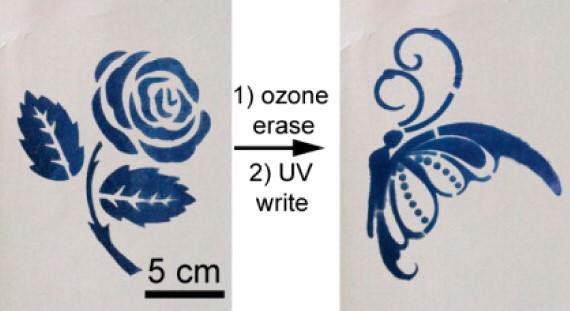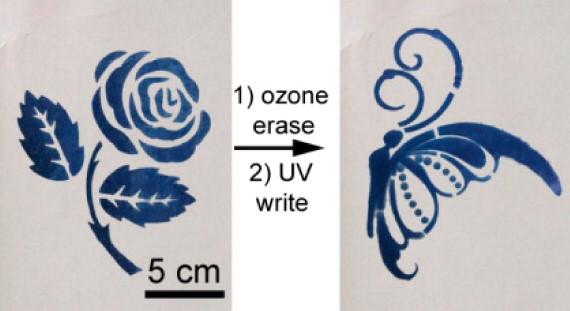
Credit: American Chemical Society
Even in today's digital age, the world still relies on paper and ink, most of which ends up in landfills or recycling centers. To reduce this waste, scientists have now developed a low-cost, environmentally friendly way to create printed materials with rewritable paper. Their report on the material, which is made out of tungsten oxide and a common polymer used in medicines and food, appears in the journal ACS Applied Materials & Interfaces.
The U.S. has been working to reduce paper waste by increasing recycling efforts for years. According to the Environmental Protection Agency, more paper is now recovered for recycling than almost all other materials combined. This saves energy, water, landfill space and greenhouse gas emissions. But even more waste could be avoided if consumers could reuse paper many times before recycling or trashing it. So far, however, such products under development often are made with toxic, expensive organic dyes. Ting Wang, Dairong Chen and colleagues wanted to come up with a better solution.
The researchers created a film by mixing low-toxicity tungsten oxide with polyvinyl pyrrolidone. To "print" on it, they exposed the material to ultraviolet light for 30 seconds or more, and it changed from white to a deep blue. To make pictures or words, a stencil can be used so that only the exposed parts turn blue. To erase them, the material can simply sit in ambient conditions for a day or two. To speed up the erasing, the researchers added heat to make the color disappear in 30 minutes. Alternatively, adding a small amount of polyacrylonitrile to the material can make designs last for up to 10 days. Testing showed the material could be printed on and erased 40 times before the quality started to decline.
###
The authors acknowledge funding from Shandong University and Shandong Province.
The abstract that accompanies this study is available here.
The American Chemical Society is a nonprofit organization chartered by the U.S. Congress. With nearly 157,000 members, ACS is the world's largest scientific society and a global leader in providing access to chemistry-related research through its multiple databases, peer-reviewed journals and scientific conferences. Its main offices are in Washington, D.C., and Columbus, Ohio.
To automatically receive news releases from the American Chemical Society, contact [email protected].
Follow us: Twitter Facebook
Media Contact
Michael Bernstein
[email protected]
202-872-6042
@ACSpressroom
http://www.acs.org





